- Home
- Megan Mccafferty
Second Helpings Page 6
Second Helpings Read online
Page 6
But what makes this step-sibling revelation even freakier is that I spent a bizillion hours with Taryn last spring, tutoring her so she wouldn’t flunk tenth grade. I agreed to help her because I felt I needed to pay her back in some way for taking the fall for me. Of course, it helps that her parents paid me ten dollars an hour to ease my guilty conscience.
Taryn is not dumb. Just abysmally unmotivated to do any work in her classes—except English and Band. But getting suspended by the administration, then shunned (as usual) when she came back to school, has left its mark. Taryn is the most reluctant conversationalist I’ve ever met. And this is coming from me, so you know it must be bad. Compared to her, I’m like, well, Sara. Whenever I tried acknowledging Taryn’s presence when we passed each other in the halls, she focused her sad brown eyes elsewhere. She spooks me out a little bit. In fact, she’s got definite Noir Bard tendencies. I still can’t help but wonder how she mustered the courage to confess to a crime she didn’t commit.
Even though it qualifies as bizarro behavior, it wasn’t all that surprising that she never mentioned Paul. She never revealed anything personal about herself. Ever. Anyway, her quasi-relation to Paul Parlipiano explained his otherwise inexplicable concern for my well-being. Thank God my mouth was empty or I surely would’ve spewed more fluids all over this poor boy.
“Well, Taryn never mentioned that she liked my editorials.”
“She really looks up to you.”
“I had no idea,” I said, strangely proud to be admired by Paul Parlipiano’s semi-sister. “She never mentioned that you were her sorta brother.”
His face dropped slightly. “Well, she got into some trouble when she was a freshman.” He was intentionally vague, but I knew all too well what Incident he was alluding to. “And it made her lose her sense of self. She has no confidence.”
“Yeah,” I replied.
“She doesn’t have a problem with my sexual orientation, but she knows that PHS isn’t the most enlightened place on earth.”
Now, I wasn’t exactly sure how to handle this moment of semi-disclosure. I mean, I already knew that he was gay. Should I just wink to let him know he didn’t have to say more?
“That’s why she loved your editorials. They made her feel like she wasn’t alone,” he continued. “It’s tough to be different at Pineville. Whether it’s her type of different, or my type of different, or yours.”
“Tell me about it,” I muttered.
“Coming here has been so great. It’s the first place where I felt like I could finally be myself, and find others who are just like me. Or people who weren’t like me at all, but would accept me as I was, anyway.”
Could such a place exist?
“I got involved with PACO, People Against Conformity and Oppression.”
“Is that, uh, a gay and lesbian organization?”
“Well, there are gays in the group, but that’s not what we’re about.
We’re an organized resistance to a world of greedy narcissism and complacency.”
“Like Key Club on steroids?”
“Not exactly.”
“Are you socialists?”
“Some of us are, but we’re really a true democracy. There are no elected leaders; there’s no hierarchy.”
I couldn’t really think of anything legitimately cool to say, so I just said, “Cool.”
“It is cool,” he said, smiling. “Unlike other, more notable anarchist groups, we believe firmly in nonviolent protest. We work within the system to try to effect change, and work outside of the system to put the heat on those who can make change. Just like you did with your articles.”
Wow. Wow. Wow. Holy shit. Wow.
“We don’t think that your beliefs should be one thing and your actions another,” Paul Parlipiano continued. “They should be one and the same.”
I do, too. I really do. Yet I still manage to have an easier time thinking about things instead of doing things. Maybe an organization like this is what I need. There was something I needed to know, though.
“Do you feel like . . .” I grasped for the right word, couldn’t find it, then just went with the first one. “Like a moron at Columbia?”
Duh. Duh. Duh. I felt moronic as soon as I said it.
“Not that you’re a moron! I mean, it’s just that it was a huge deal when you got into Columbia, because it’s a huge deal whenever anyone from Pineville gets into an Ivy League school, because it’s only had about three students get accepted to Ivy League schools in a bizillion years, and I think two of them dropped out before the end of freshman year to go to Rutgers—not that Rutgers is a bad school or anything, but it’s not Columbia, you know . . .”
He sipped his coffee while I babbled on.
“And I know I’m not a moron, either. But I worry that I’m only Pineville smart. And if I went to an Ivy League school with real students from real high schools . . .”
I realized that my get-into-the-Ivy-League intensity hadn’t faded after all. It had just transformed itself into don’t-get-into-the-Ivy-League inadequacy.
“I know what you mean,” he said when I had finally faded out. “It was a little intimidating at first. I felt really ignorant about cultural things that were embedded in my classmates’ DNA. But that’s no reason to go to another, less-intimidating school. Do you want to live in your ignorance forever? I think you could use a challenge, don’t you?”
I nodded my head. Yes, I did.
“Everyone could benefit from a challenge.” His voice grew stronger, with more conviction. I could imagine him rallying a crowd before a demonstration. “That’s what’s wrong with our society, we’ve all grown so content to sit on our asses and settle for what comes easy. Accept the challenge, Jessica!”
I was nodding more vigorously now.
“The admissions people know what they’re doing. If they think you’re smart enough to be accepted, then you’re smart enough to be there.” He paused. “From what I know about you, Jessica, you are definitely smart enough to be there.”
My head almost came off its neck hinges.
“I’m heading back to campus. Would you like to come with me? I could show you around before my next class. Maybe introduce you to some people from PACO . . .”
He totally misinterpreted the hideous facial contortion that resulted from my stifled happyhappyjoyjoyhappyhappyjoyjoyhappyhappiness.
“Oh, that’s right. You’ve got the reading at Blood and Ink.”
NO! I DON’T HAVE TO BE ANYWHERE BUT WITH YOU, PAUL PARLIPIANO, GAY MAN OF MY DREAMS!
“No, it’s not mandatory. So I don’t have anywhere else to be,” I replied as calmly as possible.
“Are you sure?”
“I’ve never been so sure,” I said. “Can I use your two-way for a second?”
I really didn’t give a damn about Blood and Ink. I never wanted to read my stuff out loud in front of the Noir Bards anyway, because I am not a writer, no matter what Mac says. So I used Paul Parlipiano’s pager to tell Mac I wasn’t going to make it to Blood and Ink and that I’d find my own way back to SPECIAL. The program was almost over anyway. What disciplinary measures could be taken against me?
Then, for the next two hours, Paul Parlipiano and I took the ultimate campus tour. Ultimate. Meaning both best and last.
I’ll spare you an encyclopedic cataloging of my sensory experiences. Why? Because it wasn’t the sight of PACO members of every conceivable ethnicity debating and B.S.-ing on the steps of Low Library, or the sound of a homeless man singing a medley of New Kids on the Block songs on the corner of 116th and Broadway, or the smell of incense, pot, and taxicab exhaust, or the acidic, stinging taste of the free wine by the carafe that came with our greasy but delicious Malaysian food, or the fuzzy rush I felt thrumming throughout my body just by being in the place where Paul Parlipiano, my crush-to-end-all-crushes, belonged, and being told that I belonged there, too. It wasn’t any of these experiences that provided me with the final answer to the Question. It was a
ll of them. And something more.
Okay. Let’s just clear the air here. I know how this looks. I know that anyone who has taken Psych 101 would say that I’m following in Paul Parlipiano’s footsteps because I’m still in love with him. But really, I am not holding out for a homosexual. Give me more credit than that.
Here’s my take on this situation. Maybe my obsession with Paul Parlipiano was orchestrated by whatever higher power in charge of these things, as a way of getting me to Columbia, or rather, New York City. Paul Parlipiano wasn’t the end, he was the means to an end. As an agnostic, I don’t know who or what or why this force is pulling me toward New York. Frankly, it’s beyond my comprehension. All I know is that when I set foot on that campus, I was so sure that it was where I was supposed to be. It wasn’t a shout that reverberated inside my body until I rocked with shock. No, it was a quiet but confident voice that I wasn’t used to hearing, one that assured me that I had just come to the place where I could be part of something great. It was the first time I’d ever felt that way in my life.
Actually, there was one other time I felt this way in my life. But it wasn’t a place that made me feel at home with myself, it was a person. A person who turned out not to be worth it. But I told myself I wasn’t going to write about that—about Him—anymore. So I’m not. So there .
the ninth
Whoo-boy! Was Mac pissed about my Manhattan vanishing act. First thing Monday morning, he took me by the arm and led me out into the hall to chastise me in pseudo privacy. I’m sure this was a huge disappointment to the rest of my classmates, who have been looking forward to eyewitnessing an act of violence against me all summer long.
It’s a wonder he’s not as chrome-domed as my dad, so enthusiastically did my prof pull his hair throughout his lengthy tirade, one that included quotations from Nietzsche, Emerson, and Virginia Woolf in addition to his own well-chosen words, like “wasted opportunity,” “selfish short-sightedness,” and “reckless endangerment of a minor.”
When he was finally done telling me how irresponsible I was and how lucky I was that he was not going to tell my parents or the program directors about this (which, quite frankly, was more about saving his own—fine!—ass than mine), I replied:
“It’s your fault, you know.”
“My fault?”
“You’re the one who told me I needed to bust out of the snow globe.”
“What?”
“You’re the one who encouraged me to go out and experience the world. Or was that just a load of crap?”
“It wasn’t crap, Jessica,” he replied. “You do need to break out of your suburban bubble.”
“But just not on your watch, right?”
He yanked on his hair.
“One unsupervised walking tour of the Upper West Side is not what I was talking about. I was talking about—”
“Well, that tour was enough to change my whole life.”
He laughed. “Your life changed in two hours?”
“Yes. I’ve totally changed my college plans.”
A not altogether friendly smile crept across his face. It was more of a mocking smile. A smile that said, Your childish antics amuse me.
“Changing your college plans does not mean you’ve changed your whole life.”
“Well, for me it does.”
“Then you were even more sheltered than I thought,” he replied. He unsnared his hands from his hair. “Let me guess. Columbia.”
It was weird to hear someone else say it. It made it true.
“Yes.”
“Tch,” he said.
We stood there for a moment because I didn’t know what do say, but Mac hadn’t made a move that would indicate that the discussion was over.
“Do you know what John Steinbeck said about New York?”
“Uh, no.”
“He said, ‘New York is an ugly city, a dirty city. Its climate is a scandal, its politics are used to frighten children, its traffic is madness, its competition is murderous. But there is one thing about it—once you have lived in New York and it has become your home, no place else is good enough.’ ”
He took a dramatic pause, as he often does after his lengthier quotations.
“Well, Jessica Darling,” he replied as he opened the classroom door, “good for you.”
He meant it, too. More than I knew at the time, because the next day Mac handed me a sealed envelope right in front of all the Noir Bards.
“What is this?” I asked.
“Your letter of recommendation,” he replied, louder than necessary, so the Grim Reaper, Nosferatu, the Lump, Barbella, Loser, and the rest of the coven would hear.
“Don’t read it, though,” he urged. “I don’t want it going to your head.”
On the envelope he had attached a Post-it that read: “ ‘Be great in act as you have been in thought.’—William Shakespeare.”
I was so stunned by this gift from my fairy godfather that I couldn’t even express my gratitude.
“Thuh,” I said.
“You’re welcome,” Mac replied.
Of course, I will probably wake up tomorrow to find that the Noir Bards have turned me into a toad.
Mac’s generosity more than makes up for the lackluster reaction I initially got. I had wanted to share my life-changing excitement with someone, anyone, after I’d returned to campus on the train that night. The resulting exchange with Bridget (and her lamprey Ashleigh) had left a lot to be desired.
“Columbia!” Bridget screamed. “Like, Julia Stiles goes there!”
“I didn’t know that.”
“Oh, yeah! And Meadow Soprano got in, so you, like, shouldn’t have any trouble.”
“Yeah, that’s exactly why I want to go to Columbia, because the fictional daughter of an HBO mob boss goes there.”
“OH MY GOD! Doesn’t Felicity go there?” she yelped again.
“Felicity who?”
“Duuuuhhh,” said Bridget and Ashleigh in unison. “Felicity from Felicity.”
“The TV show Felicity,” I said, not really getting it.
“I think she goes to a made-up school. . . .” Ashleigh’s voice trailed off, only to come back three hundred decibels louder than before. “YES!” she screamed. “It’s just like Felicity because you’re following your high-school crush to college just like she followed her high-school crush, only in your case it’s really pathetic because your crush is a homo.”
I shot Bridget a look.
“Well, Ash, like, asked me if you had boyfriend and I told her no, but then I told her about—”
“Never mind,” I said, cutting her off. I turned to Ashleigh. “For the record, I am not trying to emulate the heroine of a WB dramedy. I don’t watch those kinds of shows.”
“Whatever you say,” Ashleigh said in a singsongy tone that just made me want to clock her in that broccoli schnozz of hers.
“I. Don’t. Watch. Those. Shows.”
“Whatever.”
I’ve learned from years of experience with the Clueless Crew that it’s futile to have a constructive argument with people I hate. So I walked out of the room for the very last time, which sounds more dramatic than it really is because at the time there were only six days left in the program, anyway.
So you’re probably wondering what Mac’s letter says, right? You assumed I steamed it open and read it. Oh, ye of little faith. I didn’t— and won’t—open it. And it has little to do with respecting Mac’s wishes. The truth is, I’d rather not know what Mac said about me. I really can’t handle reading other people’s assessments of my intelligence. Like the quarterly accommodations from my teachers. They always say that they hope I learned as much from them as they did from me. Stuff like that. Excruciating. They go so overboard that I can’t believe one word of it. It’s hard to buy into all that crap when I know the chaos that’s really going on inside my head.
the eleventh
I’ve spent my last days in Mac’s class developing a strategy for breaking it to my par
ents that my final answer to the Question is one that they don’t want to hear. The four-step approach to solving my college conundrum is called The Perfection, Deception, Acception, Defection Plan. I will share my PDAD plan in the hopes that it will help others, who, like me, are unjustifiably stuck under the fat thumbs of parental totalitarianism.
Phase 1: Perfection
I will act like the daughter my parents have always wanted. By smiling a lot in their presence and offering up enough information about my life that they think I’m telling them everything, when I’m really sharing nothing of any genuine importance, they will believe that they have raised a happy, healthy, well-adjusted teen who has gotten over her growing pains and no longer needs parental policing of all her activities. This gives them permission to back off and leave me the hell alone so I can begin Phase 2.
Phase 2: Deception
Meanwhile, I will complete as much of the Columbia application process as possible without my parents’ knowledge. I’ve got Mac’s recommendation and can recycle the one Haviland wrote to get me into SPECIAL. All my parents’ financial stuff can be easily accessed on the computer, so I can even take care of that part, too. Applying on-line makes this easy—no paper trail!
Phase 3: Acception
This is the part when I get accepted to Columbia. If I don’t get accepted, I am screwed.
Phase 4: Defection
By the time I’m forced to inform my parents of my college plans, they will be so awed by my Perfection (see Phase 1) that even they will consider it unreasonable to bar me from the first-choice university that I have earned the right to attend.
I’m still working out the kinks. Phase 1 is particularly troublesome. Perfection is much easier to strive for in theory than in practice. Within five minutes of my parents’ arrival on the SPECIAL campus to pick me up and take me back to Pineville, my flawless veneer was already at risk of losing some of its luster.
Call Me Chantalle had already packed her toe shoes and Nutcrackers and douches by the time my parents walked into the room. But it was enough time to give the Darlings and the DePasquales an opportunity to do what all college-bound seniors’ parents do when they are in a room together: brag about their offspring.

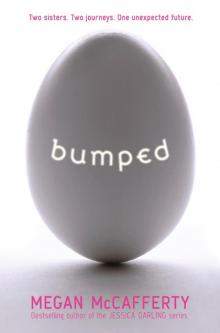 Bumped
Bumped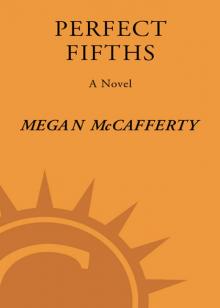 Perfect Fifths
Perfect Fifths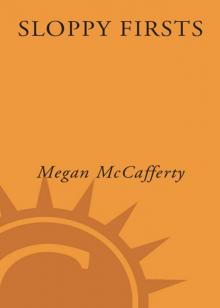 Sloppy Firsts
Sloppy Firsts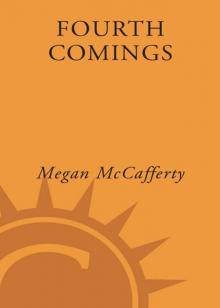 Fourth Comings
Fourth Comings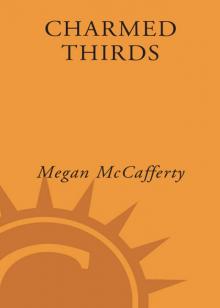 Charmed Thirds
Charmed Thirds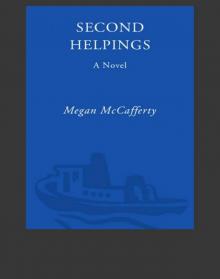 Second Helpings
Second Helpings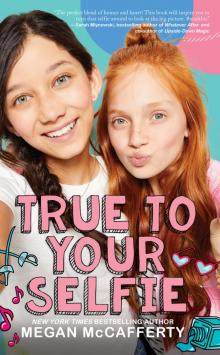 True to Your Selfie
True to Your Selfie Jessica Darling's It List
Jessica Darling's It List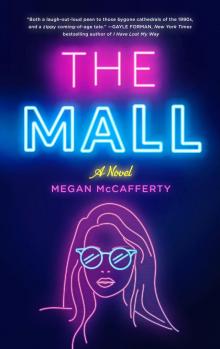 The Mall
The Mall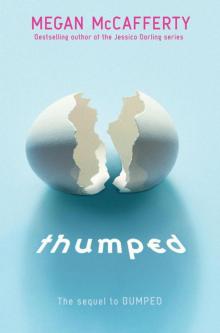 Thumped
Thumped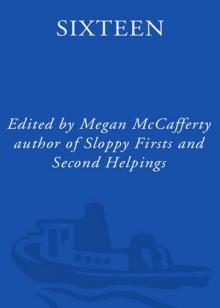 Sixteen
Sixteen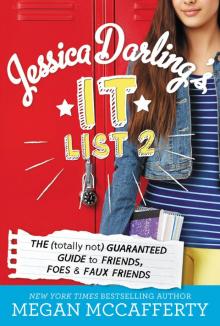 The (Totally Not) Guaranteed Guide to Friends, Foes & Faux Friends
The (Totally Not) Guaranteed Guide to Friends, Foes & Faux Friends The (Totally Not) Guaranteed Guide to Popularity, Prettiness & Perfection
The (Totally Not) Guaranteed Guide to Popularity, Prettiness & Perfection